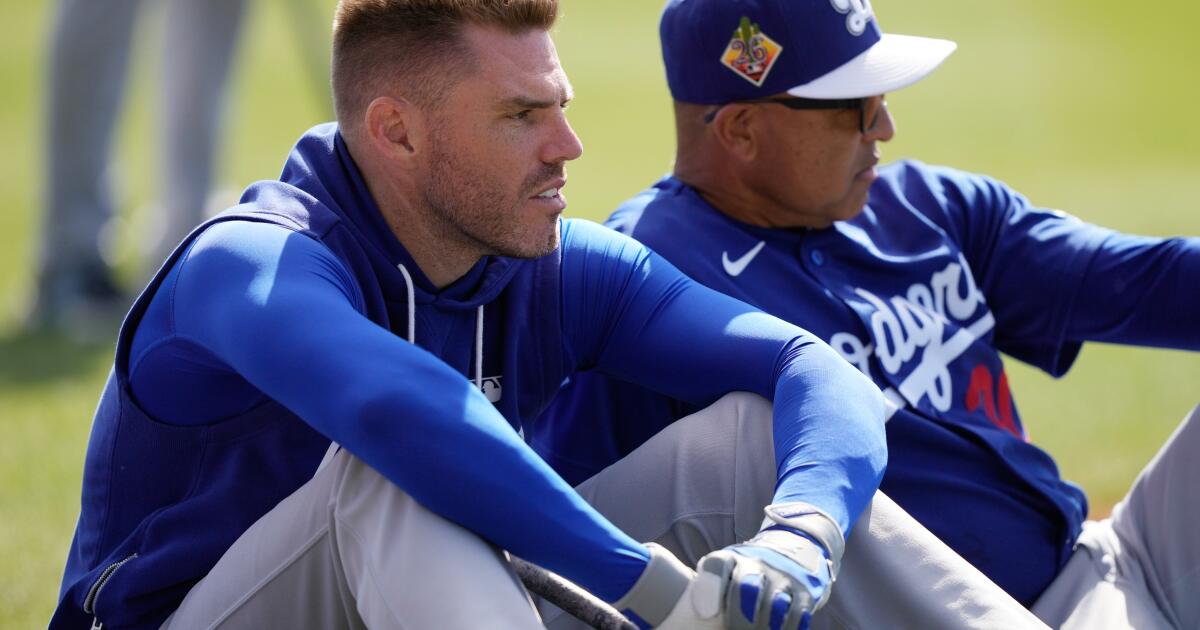Why a .300 batting average matters to Dodgers’ Freddie Freeman
PHOENIX — For the first time since he grounded out to end the 11th inning in Game 7 of the World Series, Freddie Freeman stepped into the batter’s box in the first inning Tuesday against the Cleveland Guardians at Camelback Ranch. Freeman was met with cheers by the thousands of Dodgers fans in attendance.
After popping out to third in his first at-bat, Freeman laced a double to left-center to drive in two runs in the third inning before he was lifted from the Dodgers’ 11-3 victory.
Freeman, who last season battled the lingering effects of a right ankle injury he suffered late in the 2024 season, said having a more typical offseason was crucial to regaining his fitness.
“It’s been in a good spot since I started hitting this offseason,” Freeman said of his swing. “Nice to be able to hit a ball to left-center already, that’s a good sign. … I hadn’t swung a bat till a day before FanFest last year. A normal offseason definitely helps.”
While still an All-Star and a recipient of MVP votes, Freeman has had a slight decline in production over the last two seasons compared to his first two with the Dodgers. Freeman posted on-base percentages of .407 and .410, while raking a league-leading 47 and 59 doubles, respectively, in 2022 and 2023. His OBP dropped to .378 in 2024 and .367 in 2025.
But for Freeman, it is his contact numbers that have been a thorn in his side all offseason.
His .295 batting average was the third-best in the National League last season but still was not good enough for Freeman, a career .300 hitter.
“There wasn’t a 3 at the start of my batting average last year, and that irks me,” Freeman said last week. “That’s my goal always, to hit .300. I like hits. I’m a hitter. Three at the front of a batting average means a lot to me. I know batting average and those kinds of things don’t mean a lot to a lot of people these days, but it does to me. If you hit .300, it means you’re on base a lot, and you’re scoring runs for your team, so that’s the goal, .300 again.”
Freeman landed on the injured list at the start of last April after he aggravated his surgically repaired right ankle, causing him to miss nine games and setting the tone for a season in which he never felt quite right.
“I was taping my ankle till about August,” Freeman said. “It was never really in a good spot last year. There was a lot of treatment, and I think I played all right for that, and we won again, so I’m really looking forward this year.”
One area Freeman thinks he can improve is his defense. A former Gold Glover, Freeman rated as a below-average fielder in both the defensive runs saved (minus-7) and outs above average (minus-6) metrics.
“I didn’t like the way I played defense last year and I thought it was just because I wasn’t mobile enough,” Freeman said. “So, that’s a big, big goal of mine, to play better at first this year, get to more balls, be able to cover more things. So, that’s going to be a key for me.”
Manager Dave Roberts is optimistic about what his veteran first baseman can do, even at age 36.
“I think he takes such good care of himself,” Roberts said. “I think that age is an easy one to point to, but I really believe that he’s been dinged up for two years.
“Right now, today, it’s as good as I’ve seen his swing over the course of a week sample, [better] than I have [seen] in two years. So, he’s in a good spot physically, mechanically. So, if we can keep him healthy, I just don’t see why he can’t have the year that he expects, and with that, with everything that he went through the last couple years, he was still very productive.”
Freeman said last week he hopes to play four more years, through his 20th season as a big leaguer.
“In that fourth year, I turn 40,” Freeman said. “Four is just a number that’s floated. Is it less? Is it more? I don’t know, but that’s kind of just where I’m at. I feel good right now, so that was just floated because that would be an even 20 years, I’ll be 40. I got a family that I would like to go home to. I do love this game; I love playing it, but for me, if I can do four, that would be 20 years. I think that’s enough.”
Etc.
After major shoulder surgery in 2024 that forced him to miss all of last season, right-hander Gavin Stone made his return to the mound a smooth one, pitching a scoreless first inning and striking out two against the Guardians.
“It was awesome,” said Stone, who last pitched for the Dodgers on Aug. 31, 2024. “Definitely a lot of hard work over the previous year. Rehab was a grind, but it’s good to be back out there.”
